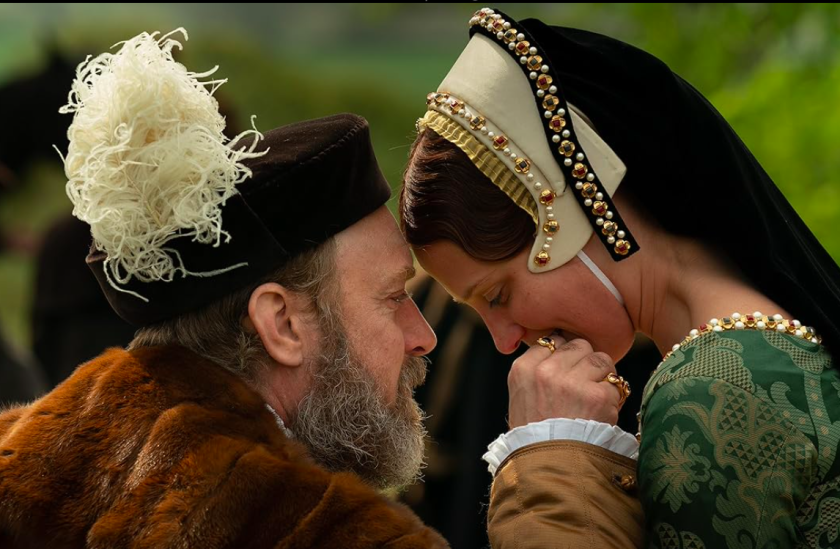Life in Tudor times is a gift that keeps giving to film and TV people, even if the history has to be bent a little for things to make sense to contemporary audiences – Elizabeth (1998) and A Man for All Seasons (1966) being two of the more successful examples of such retrofitting of the past.
Filmmakers usually try to frame someone back then as a modern protagonist with a modern agenda, even though few of those old-timers can be photoshopped into that. So here comes Katherine Parr, the sixth wife of Henry VIII, presented as something of a pre-potato feminist icon in Firebrand, a movie from Brazil’s Karim Aïnouz where a half-timbered script doesn’t quite deliver the sizzle promised by the title.
Many people won’t know what happened to Parr at the hands of the famously uxoricidal monarch, and the movie gins up tension over whether she’s to be burnt at the stake for sedition. Unfortunately, the movie poster has already delivered a spoiler: “Henry VIII had six wives. One survived,” it assures us. So this time your reviewer didn’t have to sign an NDA pledging not to give away the ending. (You actually have to do that sometimes.)
Alicia Vikander plays the wise, kind and plucky Parr whose allegiance to a radical form of Protestantism at the dawn of the Reformation almost gets her toasted. At the start, Henry has gone off to war in France and left her in charge as his Regent; he also grudgingly lets her publish prayers under her own name – two firsts for a woman that the movie stresses, and that presumably Henry can take some credit for. But when he returns home, armed with a parrot as a holiday gift, he’s as uncouth as you’d expect, and it falls to Jude Law to dig out the glimmers of charm that might have attracted Vikander to him in the first place.
The two of them are scarily good together, as the sly and impetuous Law stomps, schemes and whispers virulently into her face. “He’s changed – he listens to me,” Vikander claims when Henry is safely abroad, thinking that she’s been chosen by God to “change the King’s mind” on doctrinal matters. But on his appearance the story entertains little hope of kingly redemption as we enter a cul-de-sac of Parr’s shocking spousal abuse at the hands of the cumbrous wretch (and witness the similarly disgusting treatment of Henry’s purulent leg which, in this version, is hastening his demise).
Parr has been secretly funding the martyred, militant preacher Anne Askew (Erin Doherty), and court plotters Bishop Gardiner (Simon Russell Beale) and Edward Seymour (Eddie Marsan) eventually figure this out. Marsan, buried in a beard, is woefully underused. Yet his whiskers are as nothing to those sported by Sam Riley as Parr’s turncoat admirer Thomas Seymour: he has to act behind a veritable Hampton Court hedge of face-horticulture.
Vikander gets by with minimal make-up, while the lush and lustrous costumes (from Michael O’Connor) are another visual element of note. Director Aïnouz finds little else with which to stamp his mark in a world of misty moors, cawing crows, creaky floors and rather tame palace carousals. Maybe a game of tennis would have been nice. Horses gallop but the story canters. (The film is adapted from a novel by Elizabeth Fremantle.) At the denouement, we’re given a sudden narrative jolt by way of an ahistorical, Tarantino-ish twist that gets Parr out of her pickle.
Another thing Parr was responsible for was making legally sure Henry’s young daughter Elizabeth got to succeed him as monarch, along with (less propitiously) her sister Mary. We see Vikander trying to pull the family together around an early stab at a Victorian hearth; but there isn’t really the time, or deftness in the writing, to raise hopes that a proper discovery of fatherhood might lead Henry towards some last-minute grace. (Junia Rees is the future Virgin Queen; Patsy Ferran is striking as the Latin-spouting, obsessional Mary.)
For his part, Henry can lay claim to some song compositions, one of which Law belts out in his best Richard Harris, and the ditty is actually attributed to “Henry VIII” among the music titles in the end crawl. I doubt today’s royals will be clamouring for royalties.
- More film reviews on theartsdesk















Add comment